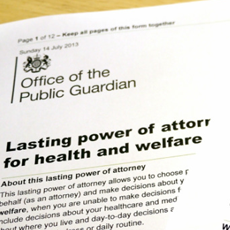Continuing our series on Lasting Powers of Attorney (LPA). Today’s focus is “What is a Health and Welfare Power of Attorney?”, including:
ℹ️ What does it cover?
ℹ️ When can it be used?
ℹ️ Why do I need one?
ℹ️ How Morecambe Bay Wills can help you
WHAT IS IT?
There are two types of LPA – one covering Property and Financial Affairs, and the other covering Health and Welfare.
The Health and Welfare LPA allows attorneys to make decisions on the donor’s behalf about personal welfare, care and treatment. This ranges from simple day to day care decisions, decisions about care homes, and all the way up to consenting to or refusing life sustaining treatment (if included in the LPA).
An LPA is not a “Living Will” (advance directive) which is a legal statement from the donor about which medical treatments they don’t want. If one exists, it should be used in conjunction with the LPA.
A health and welfare attorney can make (or help the donor make) decisions about things like:
- daily routine, for example washing, dressing and eating
- medical care
- where the donor lives
If the LPA includes instructions about refusing or consenting to treatment, the attorney can make most of the decisions about medical treatment, and can:
- show the LPA to care staff
- sign medical consent forms
- make decisions in the donor’s best interests
WHEN CAN IT BE USED?
A health and welfare LPA, once registered with the Office of the Public Guardian, can only be used once the donor lacks mental capacity. However, it is useful to have in place early, so it can be used as and when needed. Decisions can then be made on the donor’s behalf if they are ill, unconscious or because of the onset of a condition such as dementia.
If you are caring for someone, it might be that you need to use it straightaway, if the person you care for is very ill. On the other hand, the document might sit in a drawer for years before it’s needed, but it can be reassuring to know that the legal paperwork is in place should it ever be needed. A Power of Attorney is a bit like holiday insurance: it seems like an unnecessary expense at the time or that you will never need it. But, when you do, you are glad you have it!
WHY DO I NEED IT?
If you are in an accident or become incapacitated through an event such as a stroke, or are diagnosed with an illness such as Alzheimer’s, you may not be able to make important decisions, so it is essential to have someone who can act on your behalf.
If you’re married or in a civil partnership, you may have assumed that your spouse would automatically be able to deal with your bank accounts and pensions, and make decisions about your health and care, if you lose the ability to do so. This is not the case.
If no LPA is in place, relatives would need to apply to the Court of Protection to make welfare decisions or to appoint a Deputy. This can cost £3000-4000 in initial costs and then ongoing fees on top. An LPA costs £82 to register, plus and fees for preparing the document.
HOW CAN WE HELP?
Morecambe Bay Wills offer a cost-effective service which includes:
– Providing information about the decisions you need to make
– Visiting you at home to discuss this and answer questions
– Confirming your capacity to make these decisions
– Drafting forms for you to review and preparing final versions
– Obtaining required signatures via visits or registered post
– Submitting completed LPAs to the OPG on your behalf
– Responding to, and resolving, any OPG queries
– Giving you progress updates until certified LPAs are received
– Providing (optional) safe storage for your documents
Our service costs £150 for both LPAs, £250 for a couple, in addition to the OPG registration fees of £82 per LPA. We offer further discounts for those on low incomes, those who are facing an early cancer or dementia diagnosis (where we believe these documents are critical), and our existing Wills customers. We also guarantee that if there are any mistakes identified by the OPG, we will cover the re-submission costs. Don’t leave making an LPA for the future. Contact us now to arrange an initial discussion.


